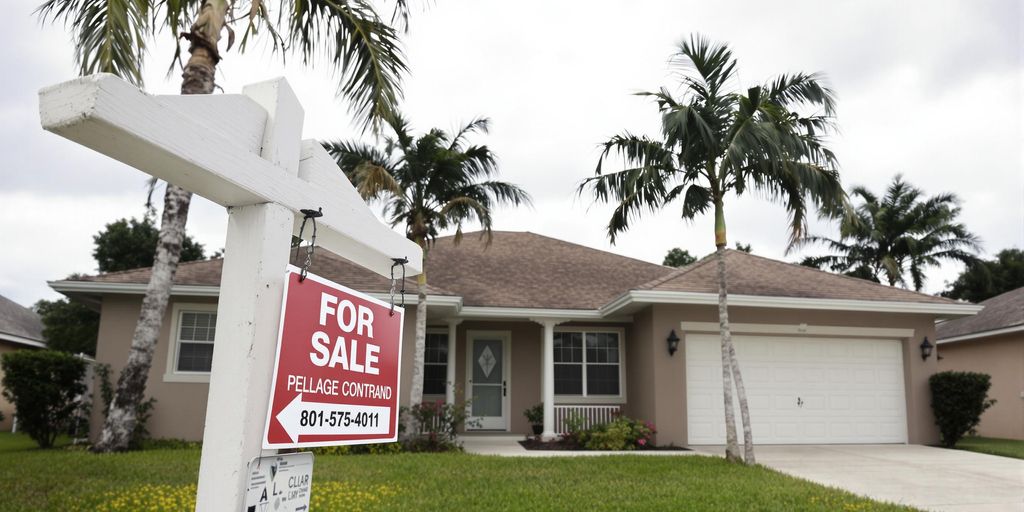Florida’s once-booming housing market is now facing a significant downturn, characterized by slowing sales, increasing inventory, and notable price declines in key areas. This shift, particularly pronounced in cities like Cape Coral, raises concerns about affordability, rising insurance costs, and the sustainability of previous rapid appreciation.
Florida’s Housing Market Cools Down
Florida’s real estate market, which experienced unprecedented growth during the pandemic, is now undergoing a substantial correction. Data from April 2025 indicates a statewide average appreciation dip of -0.8%, with the median sales price falling below the national median to $390,000. This contrasts sharply with the national trend, which still projects a 4.3% increase in home prices for the year ahead.
Cape Coral: At the Epicenter of the Downturn
Cape Coral has emerged as a prime example of Florida’s housing market woes. It recorded the largest year-over-year decline in home prices among the top 100 markets, with a significant -6.5% drop by April 2025. Prices in Cape Coral are now back to spring 2022 levels. This rapid decline is attributed to:
- Rapid Appreciation: Explosive growth made the market vulnerable to corrections.
- Affordability Concerns: Soaring prices, coupled with rising interest rates, have priced out many potential buyers.
- High Vacancy Rates: Cape Coral leads with a 25.72% vacancy rate, driven by new construction.
Key Factors Driving the Slowdown
Several interconnected factors are contributing to the current state of Florida’s housing market:
- Affordability Crisis: High home prices, combined with elevated mortgage rates (around 7-8%), have significantly reduced buyer demand. The income required to afford a median-priced home is now out of reach for many.
- Rising Insurance Costs: Skyrocketing homeowner’s insurance premiums, particularly in coastal areas, add a substantial burden to homeownership, making Florida less attractive.
- Increased Inventory: As sales slow, homes are staying on the market longer, leading to an increase in available properties. This shifts leverage from sellers to buyers.
- Investor Pullback: Higher interest rates and the prospect of declining prices have made real estate investments less appealing, reducing a key source of demand.
- Post-Pandemic Normalization: The frantic pace of migration seen during the pandemic has slowed, and the remote work trend is stabilizing, reducing the influx of new buyers.
Markets at High Risk of Price Decline
According to Cotality (formerly CoreLogic) data for April 2025, five Florida markets are at a "very high risk" of significant price declines. These markets experienced some of the most rapid appreciation and are now facing the steepest corrections.
| Rank | Market Name |
|---|---|
| 1 | Cape Coral, FL |
| 2 | Lakeland, FL |
| 3 | North Port, FL |
| 4 | St. Petersburg, FL |
| 5 | West Palm Beach, FL |
- These markets are experiencing a period of price discovery, where sellers are adjusting expectations to meet current demand.
Outlook for Buyers and Sellers
For sellers in these high-risk markets, realistic pricing based on current conditions is crucial to avoid prolonged market times. Negotiations and concessions are becoming more common. For buyers, the current market presents opportunities for more leverage and a wider selection of homes. However, due diligence, including factoring in the total cost of ownership (mortgage, insurance, taxes), remains paramount.
While some experts suggest the slowdown is a necessary correction rather than a full-blown crash, the immediate outlook for these specific Florida markets remains cautious, with continued risk of price decline.
Sources
- Florida’s Cape Coral Is Now the Worst Housing Market in America, WSJ.
- Is Cape Coral the Next Florida Housing Market to Crash?, Norada Real Estate Investments.
- A look into Florida real estate market, home sales slowdown, WUSF.
- 3 Florida Housing Markets Having the Highest Vacancy Rates, Norada Real Estate Investments.
- 5 Popular Florida Housing Markets Are at High Risk of Price Crash, Norada Real Estate Investments.


